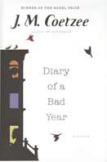Point Counterpoint
J. M. Coetzee’s critics suggested some years ago that he and some others (Zakes Mda, Zoe Wicomb) needed to use their artistry more obviously in the political cause. Defenders argued that literature had to maintain and expand South Africa’s literary culture for a future that otherwise would have been emaciated by the lean times of racial oppression. They were instead bearing witness to an inconsolable mourning, and clearing a space for some hope and possible forgiveness. But now that he has won the prestigious Mann-Booker prize twice and the Nobel Prize (only once) and has moved to Australia, Coetzee seems, almost as a lark, to have let fly with a preposterously gem-encrusted political screed, a double-cream-laden macédoine of opinions on contemporary newsy diversions as various as terrorism, intelligent design, authority in fiction and pedophilia.
If that were all, the book would be interesting enough. But coming from Coetzee it is much more fun than that. After you have read Diary of a Bad Year, I recommend you track down some other readers and ask how they did it, and I mean the question literally. The pages of the book are divided in half, with the “opinions” offered in the top sector and a more typical narrative advancing on the second half of the page. Twenty-five pages in, a third section is added at the bottom of each page. Occasionally, the sentences carry over onto the next page. Every once in a while paragraphs continue on into the next chapter. The reader is left to decide whether to proceed across pages in the heady political section (ah, at last we are getting the reclusive author’s real views on Bush and the literary establishment!), or stop and jump down to the two lower narratives, which—this being Coetzee—are pretty compelling stories.
Much like a combination of Lolita and the troubled relationship between W. B. Yeats and the actress/Irish revolutionary Maud Gonne, the story involves an aging protagonist from South Africa who hires the voluptuous Filipina lady living downstairs, half his age, to be his typist. Anya, meanwhile, has a cynical stockbroker lover, Alan, who is the polar opposite of the protagonist—much like Yeats’s description of the man Maud Gonne ended up marrying. When Alan’s story begins in the bottom third of the page, that new narrative sounds a lot like a Harold Pinter play, with Darwinian aggression simmering restlessly just below the surface of the taut language. So, in a short volume, Coetzee has found a structure for fascinating musings on any number of contemporary issues, a sexy-but-sublimated love story and a tantalizing story of crime and implied violence.
And there’s more. The book is really about aging or—and this is again reminiscent of Yeats—about having transcendent aspirations that are housed in a dying body, situated in one little place and time. (At one point he rifles through a box of his father’s junk that he has neglected to cull for 30 years, and finds written on a scrap of paper the phrase “can something be done Im [sic] dying.”) To say that Coetzee has written a book about the mind/body problem is to strip his creation of all its ingenuity and beauty, since this reader, for one, was unexpectedly brought to tears at the novel’s conclusion. In the protagonist’s eyes, the book he is dictating (one-third of Coetzee’s volume, recall) is a contest between the philosophies of Dostoevsky and Tolstoy, a confection made up of “the personal anguish of a soul unable to bear the horrors of this world.” But when the very different voices of Anya and the scurrilous Alan are added to the mix, we see the anguished writer from two fresh (if biased) points of view and recognize the “pessimistic anarchistic quietism” that he espouses for what it truly is: the struggle of an accomplished man in his closing decades, coming to terms with aspects of life that lesser individuals choose to evade: sincerity, integrity, belonging, dishonor, materialism, reason, fatherhood.
Early in the book the protagonist argues that those around him cannot be reasoned with by an appeal to moral principles, since their lives are full of contradictions and they are used to accommodating themselves to them. Instead, he writes, one must “attack the metaphysical, supra-empirical status of necessità and show that to be fraudulent.” I take this to mean that he wants to demonstrate that we cannot wiggle away from the consequences of our choices. By demonstrating the distinction between Anya and Alan in the “lower” two-thirds of the book, the higher consciousness of the protagonist is rendered in soap-opera format and made not only comprehensible but, finally, compelling. This was the sort of reading experience in which I found myself frequently turning to the author’s photo on the jacket, as if asking myself about the relation between the artistry and the artist—or, as Yeats might put it, the dancer and the dance.
This article also appeared in print, under the headline “Point Counterpoint,” in the September 1, 2008, issue.








